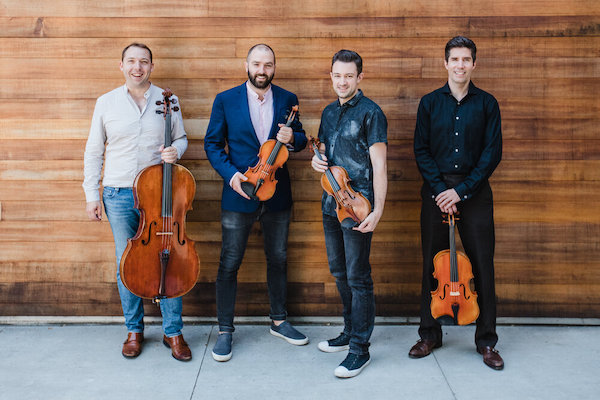Classical Concert Review: The Escher String Quartet at Rockport — Nonstop Delight
By Susan Miron
I immediately heard how adept these players were — and how brilliantly they played together.

The Escher String Quartet — believe the buzz. Photo: Anna Kariel
For several years, there’s been a serious buzz out there in Classical Music Land about the Escher String Quartet. I somehow missed its launch into the Quartet Stratosphere, so I only had the standard bio fodder to go by — lots of impressive PR — when I chose to make the trek up to the Rockport Chamber Music Festival. It turns out that my expectations were far too modest.
Initially, there were complications of the extra-musical variety. The quartet — violinists Adam Barnett-Hart and Brendan Speltz, violist Pierre Lapointe, and cellist Brook Speltz — was almost upstaged by a fire drill that commenced 20 minutes before the concert began. All of us in the sold-out crowd poured out into the rain, some with umbrellas, others taking the opportunity to keep dry by shopping across the street. By the starting time, we were very happy to be inside.
A gorgeous Mozart Quartet (K. 589, “Prussian”) in B-Flat Major (1790) opened the program. I was still drying off and the music took on an extra dimension of beauty and calm. During the first movement I sensed we were in for a remarkable afternoon: the performance’s finesse, braininess, and ebullience characterized the rest of the concert. I immediately heard how adept these players were — and how brilliantly they played together. The musicians were dressed — unusual these days — in black suits and long neckties, and used sheet music rather than iPads. The sky outside was hardly its customary gorgeous self, but these four string players knew a thing or two about color and passion that more than made up for the usual view of little boats and swimmers. (Note: There are many reasons to love the Rockport Chamber Music Festival. Its program notes are consistently informative, its volunteers are always friendly, and the beautiful view from the third floor lounge with its wine bar and cookies is as close to a vacation as some of us will get.)
Violinist Speltz helpfully introduced us to both the world of Béla Bartók and the Fourth of his six quartets. He paid homage to the fact that the Hungarian composer was “the first musicologist.” Early in his career, Bartók undertook collecting trips with his colleague, composer Zoltán Kodály, with whom, in 1906, he collaborated on a volume of Hungarian songs that they had collected. An enthusiast, Bartok continued to collect music from Transylvania, North Africa, and Romania. His music is imbued with folk elements, as well as effective uses of mirror-images and symmetry, the latter an integral part of this quartet’s structure. The program notes by Keith Horner describe the last movement as “a ferocious Magyar dance, thrilling in its energy, exuberant in its forward drive.” Well, yes. It was so frenetic I imagined I would need a defibrillator. Luckily, an intermission gave some of us the time to let our heartbeats slow down.
Czech composer Antonin Dvorák consistently wrote music filled with enormous warmth, emotion, and lyricism. The Eschers supplied a wonderful rendition of his Quartet #11 in C Major, Op. 61 (1881). I hadn’t known this piece (Dvorák wrote 14 string quartets) and was impressed by its roller-coaster exuberance. The first movement was so serene you might imagine that you were relaxing while swinging in a hammock. The highly sentimental second movement featured passages of inviting tenderness, while the fourth movement was so brimming with joy it reminded me of background music for someone who had just learned that he or she had won the lottery. The audience was thrilled.
How could the Escher Quartet top this? It did, with a fabulous encore — the second movement from Maurice Ravel’s beloved string quartet. Concerts don’t get better than this one.
Susan Miron, a harpist, has been a book reviewer for over 30 years for a large variety of literary publications and newspapers. Her fields of expertise were East and Central European, Irish, and Israeli literature. Susan covers classical music for the Arts Fuse and the Boston Musical Intelligencer.
